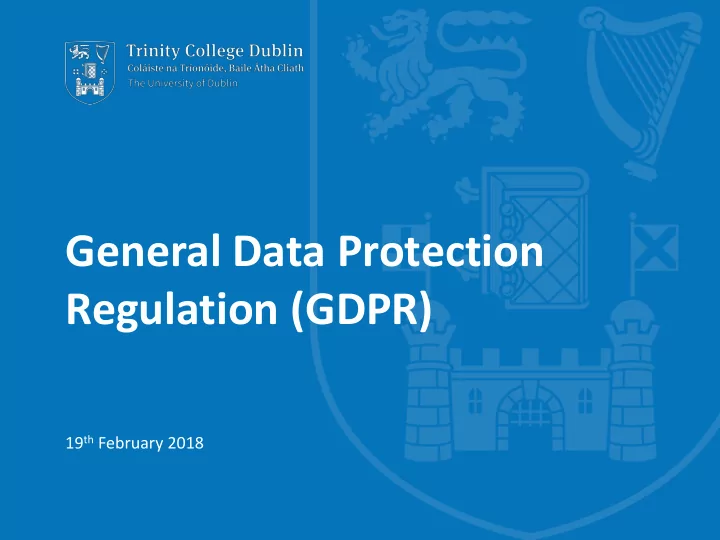

General Data Protection Regulation (GDPR) 19 th February 2018
At a glance • Effective 25 th May 2018. • Extra-territorial. • Single legislation for all EU member states, almost! • Imposes stricter regulations on any organisation with access to EU personal data. • Provides greater clarity for organisations. • More aggressive enforcement mechanisms.
What do I need to know? Principles Rights Responsibilities
How can I process personal data lawfully? Consent Formation of a contract Statutory obligation Vital interest Public interest Legitimate Interest * *not applicable to public bodies in the performance of their tasks
Other requirements for processing Specified, explicit and legitimate* Transparency Retention Minimisation Security, Integrity and confidentiality Accuracy Accountability
Valid consent The request should be intelligible and easily • accessible and separate from other matters. The data subject must be informed of their • right to withdraw consent. Must be freely given. • When the processing has multiple purposes, • consent should be given for all of them. The data subject must be informed of their • right to withdraw consent. . be freely given.
Transparency Trinity College Dublin, The University of Dublin
How to process special categories of data? Special Categories of Personal Data Health & Genetic Racial & Ethnic Sexual Religious and Philosophical Political Biometric Trade Union Children's data Criminal Convictions
Conditions for processing special categories A lawful basis plus one of the following - • Explicit Consent • Employment, Social Protection law • Vital interests • Legitimate activities by a foundation or not for profit re its members • Public data • Legal claims • Substantial public interest • Medical or Public Health • Scientific research or archiving in the public interest
What rights do individuals have ? Notification Access Erasure Rectification Portability Profiling Automated decisions Restrictions*
Exemptions for Research To facilitate scientific and historical research. ‒ Right of access. ‒ Right of rectification and restriction. ‒ Right to object to processing.* “if the rights render impossible or seriously impair the achievement of the specific purposes ” and “derogations are necessary”. *where processing is based on legitimate interest or public interest
Exemptions for Research To facilitate scientific and historical research. ‒ Further processing “shall not be considered to be incompatible with the initial purposes”. ‒ Right to be forgotten i.e. “personal data may be stored for longer periods”. “in accordance with Article 89” “implementation of the appropriate technical and organisational measures required by this Regulation in order to safeguard the rights and freedoms of the data subject "
Conditions for Exemptions in Art 89 Exemptions can only be availed of if technical and organisational safeguards are implemented which respect the principle of data minimisation: ‒ technical and organisational measures; ‒ Pseudonymisation and anonymisation; ‒ Comply with other legislation e.g. Regulation (EU) No 536/2014 re clinical trials; Assess each scenario in context with a DPIA.
What other responsibilities are there? Records of Processing Data Processors Processing Agreements Data Transfers outside EEA Data Breach Reports Data Protection by Design Data Protection Impact Assessments DPO
Records of Processing
Data Protection Impact Assessment A DPIA is mandatory: when the processing, is likely to result in a high risk to the rights and freedoms of natural persons; when carrying out automated processing or profiling, processing sensitive personal data or data relating to vulnerable individuals; carrying out monitoring of a public area on a large scale. It is particularly relevant when a new data processing technology is being introduced.
Data Protection Impact Assessment
GDPR Guidance Data Protection Toolkit Data Protection Manual Data Protection Manual for Researchers Privacy Statement Template Privacy Statement Procedure Do I need a DPIA questionnaire Privacy Impact Assessment Procedure Privacy Impact Assessment Template Subject Access Request Procedure Subject Access Request Template Breach Notification Procedure Breach Notification Report Template Consent Procedure Sample Consent Template Consent Procedure for Researchers Parental Consent Template Data Sharing Protocol Data Processing Agreement Template FAQs
Questions?
Recommend
More recommend